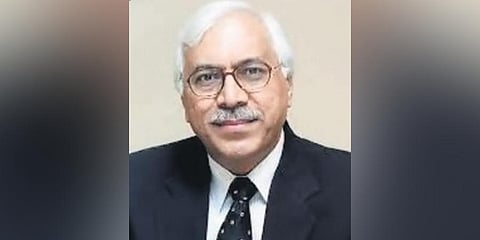

NEW DELHI: After the Election Commission of India (ECI) wrote to political parties to detail information regarding the financial viability of poll promises in manifestos, former Chief Election Commissioner SY Quraishi said that the EC’s constitutional mandate is to conduct free and fair elections and it shouldn’t be dragged into the political domain.
The EC, on Tuesday, proposed to amend the Model Code of Conduct (MCC) to add a proforma, which seeks details of revenue generation ways, extent, and expanse of coverage, and fiscal implication of the poll vows made by political parties in the manifestos. The poll panel asked all political parties to submit the information by October 19.
Speaking to this newspaper, Quraishi pointed out that any guidelines under MCC will be meaningless unless the EC is empowered to penalise violators of the same. The former CEC also argued that the EC should be granted the power to deregister political parties, which flout the model code of conduct. To call it a U-turn by EC is wrong. EC has come into the picture because of SC’s direction, he says.
“EC came up with the new proposal after being told by the SC. It is not the mandate of the EC to do it. It has no power to punish political parties if they are found to flout laws, and they don’t have the power to deregister them. The EC cannot sit in judgment to check whether the parties have adhered to their manifestos or not,” he said.
He said that though the EC had framed guidelines for political parties in 2014, as directed by the Supreme Court, it failed to have any impact. The case referred to the SC’s 2013 ruling in the S Subramaniam Balaji vs Government of Tamil Nadu related to promises made by parties in their manifestos. Back then, political parties strongly objected to the model code of conduct, he said.
“The new proposal is only an elaboration of the previous one, which was issued in 2014. Upon a court ruling in 2013, the EC issued guidelines after consulting all political parties. In January 2014, the EC gave notices to both DMK and AIADMK for violating the code of conduct. But nothing came out of it,” he said. In its letter to the political parties, the EC said that though the existing guidelines under MCC require parties and candidates to explain the rationale for promises, the EC observes that the declarations are always ambiguous and routine.
However, Quraishi says that the real forum for debating the cost of poll promises and whether parties fulfilled the promises in the manifestos should be the Parliament and state Assemblies, he said, adding that the EC shouldn’t be dragged into the political domain. “Nobody can tell whether all parties fulfilled the manifestos or not. There are no economists or experts in EC to keep a check on these. The debate on whether manifesto promises have been fulfilled or not should be happening in Parliament and state Assemblies,” he said.
The new directive comes amidst heated debate on freebies, offered by political parties. Talking about row over freebies, Quraishi said that the EC’s original stand is that it’s difficult to define the term freebie. “How will one distinguish between freebies and welfare schemes? The EC had said that one man’s freebie is another man’s welfare scheme,” he said.
Earlier, the EC had told the Supreme Court that there is no precise definition for freebies and also said that there is no “precise definition” of the term ‘in the existing legal or policy framework. It also said that it is difficult to define the term ‘irrational freebies’ as both are subjective and open to interpretation.
Freebies can have a different impact on society, economy, and equity depending upon the situation, context, and time period.